On December 10th, during COP28, the global decision-making body of the United Nations Framework Convention on Climate Change (UNFCCC), the "Digital Transformation Day -- Digital Technology and AI for Carbon Neutrality" side event, co-organized by the TianGong Initiative, was held in the China Pavilion Zone I. Professor Xu Ming, the founder of the TianGong Initiative and a faculty member of the School of Environment at Tsinghua University, delivered two keynote speeches at this side event and the “Digital Standards and Accounting for Carbon Neutrality” side event. He shared solutions for low-carbon development and called for the joint development of an open and transparent carbon footprint data system. In the same day, Professor Xu also accepted an interview with China Central Television (CCTV).
From November 30 to December 12, 2023, the COP28 was held in Dubai. On December 10th, for the first time, the Ministry of Ecology and Environment of China established a "Digital Transformation Day" in the China Pavilion. The synergistic transformation of digitalization and green, low-carbon development is a key pathway to achieving the carbon neutrality goal. It presents China and the world with unprecedented opportunities and challenges for sustainable development. The theme day event showcased China's achievements, experiences, and challenges in the field of coordinated development of digitalization and green transformation. Additionally, the event facilitated in-depth exchanges and discussions between Chinese delegates and key international institutions and experts in the field.
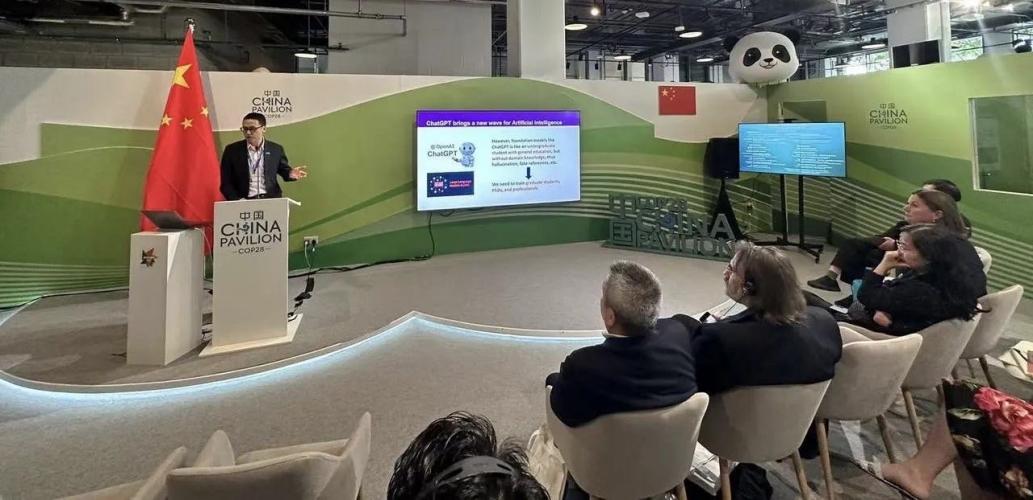
The TianGong Initiative co-organizes the side event “Digital Technology and AI for Carbon Neutrality”, showcasing China's innovative practices in low-carbon digital transformation
The side event II of the Digital Transformation Day, entitled “Digital Technology and AI for Carbon Neutrality”, was hosted by Alibaba Group and NaaS Technology, and co-organized by the TianGong Initiative, Alibaba Cloud Intelligence Group, and the International Institute for Applied Systems Analysis (IIASA). The event aimed to explore technological breakthroughs and innovative digital solutions in the process of low-carbon transformation. It provided opportunities for communication and cooperation in green innovation across industries. Distinguished guests who attended and delivered speeches included Xu Huaqing, Director of the National Center for Climate Change Strategy and International Cooperation, Eric Solheim, Co-Chair of the Europe-Asia Center, Nebojsa Nakicenovic, Vice Chairman of the Group of Chief Scientific Advisors to the European Commission, and Erik Berglöf, Chief Economist of the Asian Infrastructure Investment Bank.
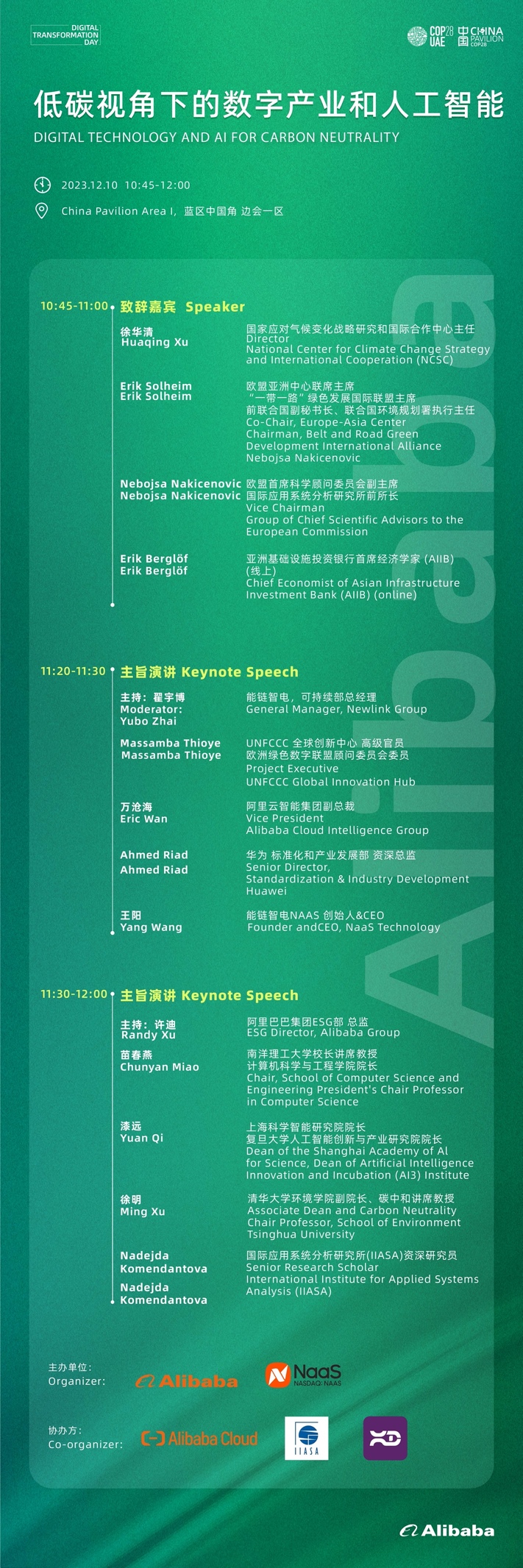
Professor Xu Ming delivered a keynote speech entitled “The Application of Large Language Models (LLMs) in Environment and Sustainable Development”. In his speech, he emphasized the new wave of artificial intelligence brought by ChatGPT, while also noting that such foundational LLMs remain general and basic in terms of domain knowledge. He mentioned that these models may exhibit hallucinations and make it difficult to meet professional needs. In light of this, the TianGong Initiative has launched the world's first large language model application focused on the environment and sustainability— “TianGong AI”. This innovative practice demonstrates China's innovative practices and progress in the field of green, low-carbon digital transformation to the international community.
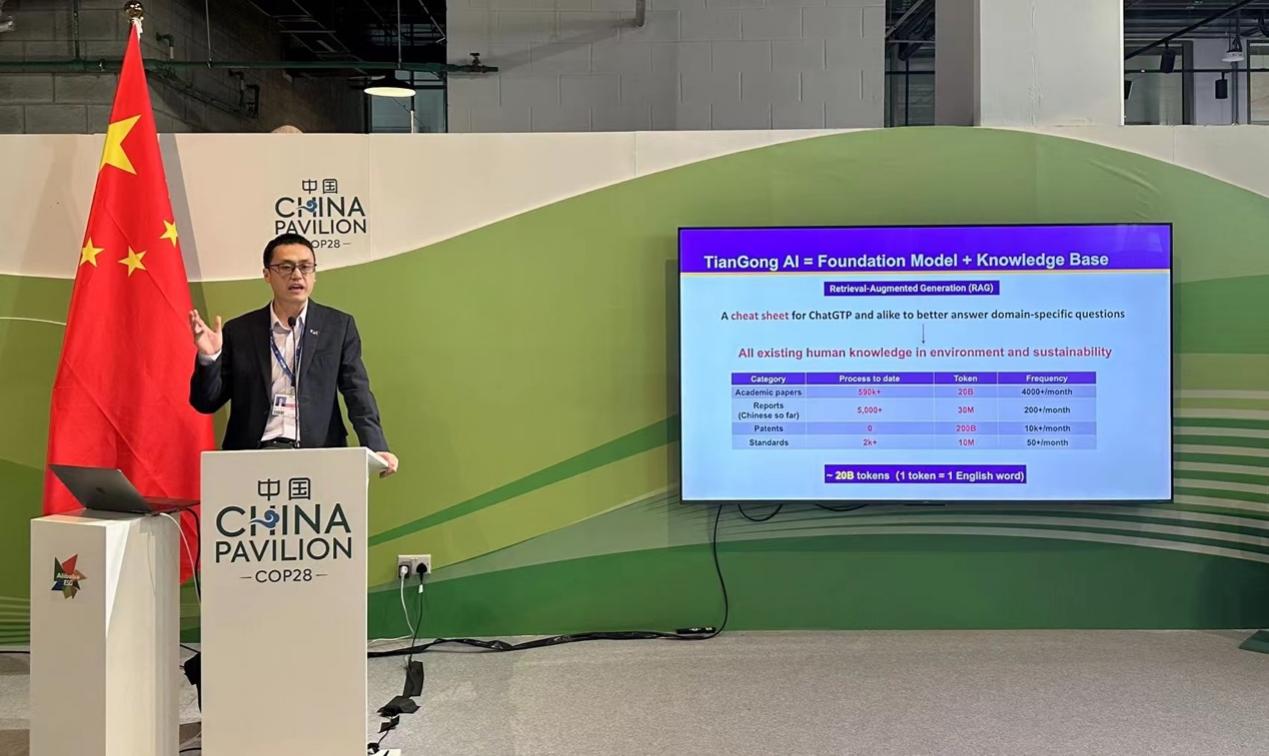
At the side event “Digitalization for Carbon Neutrality Standards and Accounting”, Professor Xu Ming calls for breaking data hegemony and jointly building an open and transparent data system.
The side event III of the Digital Transformation Day, entitled “Digitalization for Carbon Neutrality Standards and Accounting”, was co-hosted by the China Environmental United Certification Center, Alibaba Group, the World Business Council for Sustainable Development (WBCSD), and the World Resources Institute. The event was co-organized by Cainiao, Xianyu Network, Bureau Veritas Certification, and the Carbon Trust. Attendees and speakers included Sun Zhen, Deputy Director of the General Department of Climate Change at the Ministry of Ecology and Environment, Hua Jingdong, Vice Chairman of the WBCSD, and Sharon Bligh, Managing Director of Health and Climate at the Consumer Goods Forum. During this side event, experts discussed how to coordinate governments, professional institutions, enterprises and other stakeholders to jointly promote the improvement, innovation, and wider application of carbon standards and accounting systems. This discussion aims to accelerate carbon reduction actions globally.
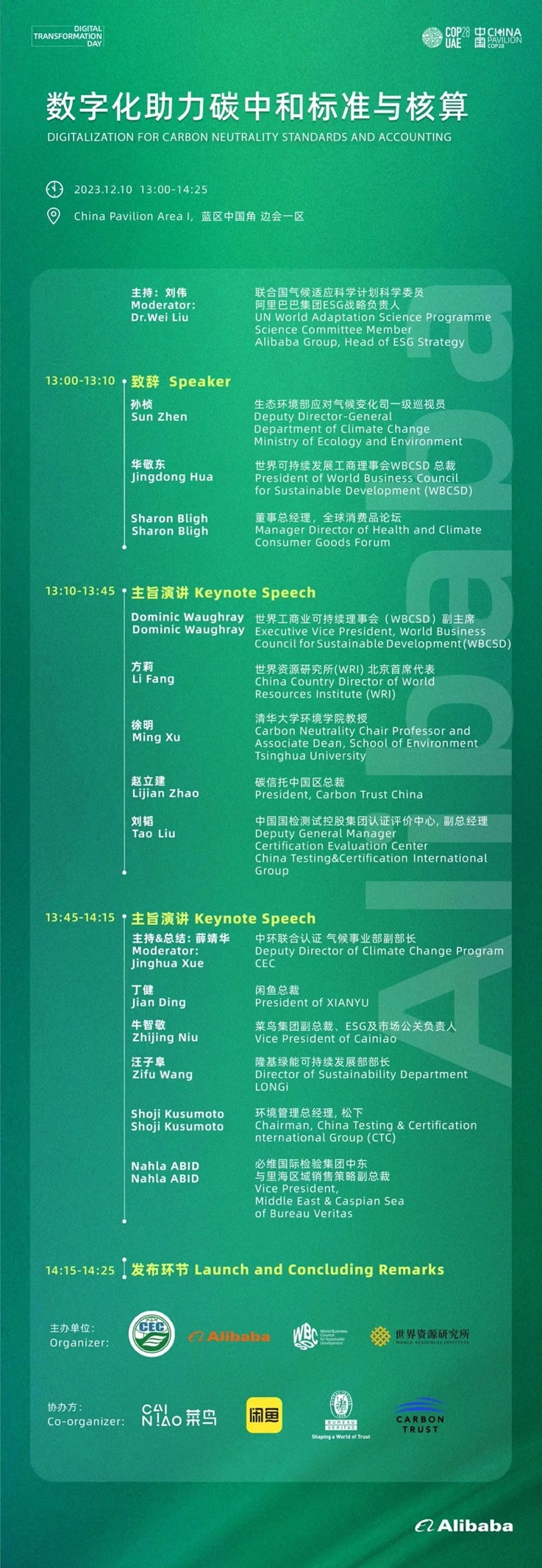
Professor Xu Ming delivered a keynote speech entitled “Open and Transparent Carbon Footprint Data”. In his speech, he emphasized that unit process data based on Life Cycle Assessment (LCA) is fundamental for carbon footprint accounting. He also highlighted issues present in current international databases, such as “black box processing, market prioritization, and data hegemony”. To address these issues, Professor Xu Ming called for a community co-creation approach to break data barriers and to jointly establish and improve databases. He stressed the importance of establishing an open, transparent, and traceable data mechanism. Professor Xu Ming also introduced the “TianGong Initiative”, a project that has united 30 domestic and international universities and research institutions, along with more than 150 industry experts. Together, they have built the country's first open and transparent carbon footprint background database—the “TianGong LCA Database”. Professor Xu Ming shared the Chinese experience of carbon footprint data being “open, shared, transparent, and credible”. This contributes to overcoming green trade barriers and paving the way for international mutual recognition of carbon footprints, and provides a platform and innovative mechanism for China to engage in dialogue with international stakeholders.
After the event, Professor Xu Ming was interviewed by the Economic News on CCTV-2 Finance Channel. In the interview, he emphasized the importance of product carbon footprint management for Chinese export enterprises when dealing with international green trade barriers. He also pointed out that unit process data is the core foundation for conducting life cycle inventory analysis and product carbon footprint accounting.
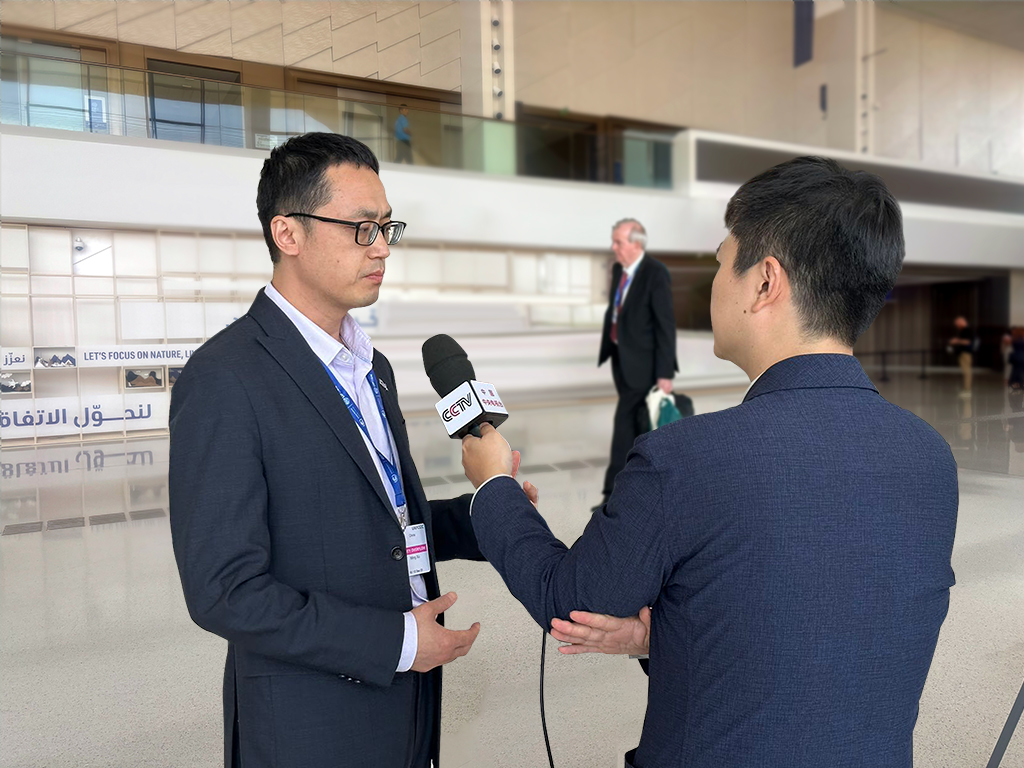
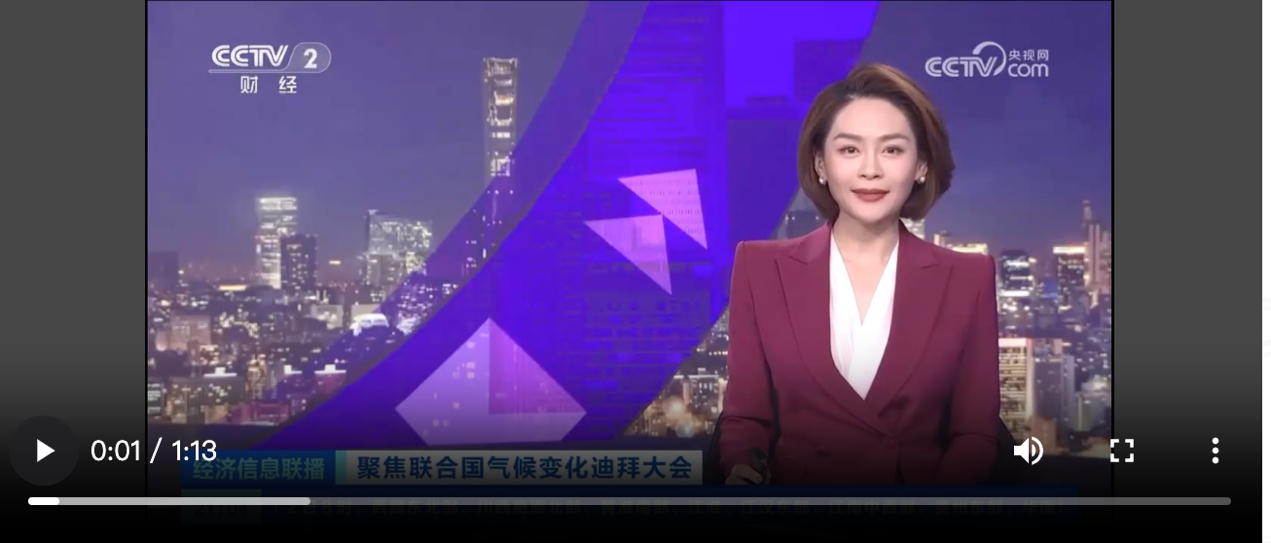
As one of the co-organizers of the China Pavilion side events at the COP28, the TianGong Initiative has demonstrated China's strength and experience in digital transformation of low-carbon development. This showcases China's commitment as a responsible major country in actively addressing climate change and leading global climate governance. By launching two innovative projects—the TianGong LCA Database and TianGong AI—the TianGong Initiative aims to support the effective implementation of the Paris Agreement and contribute to building a cleaner and better world.





